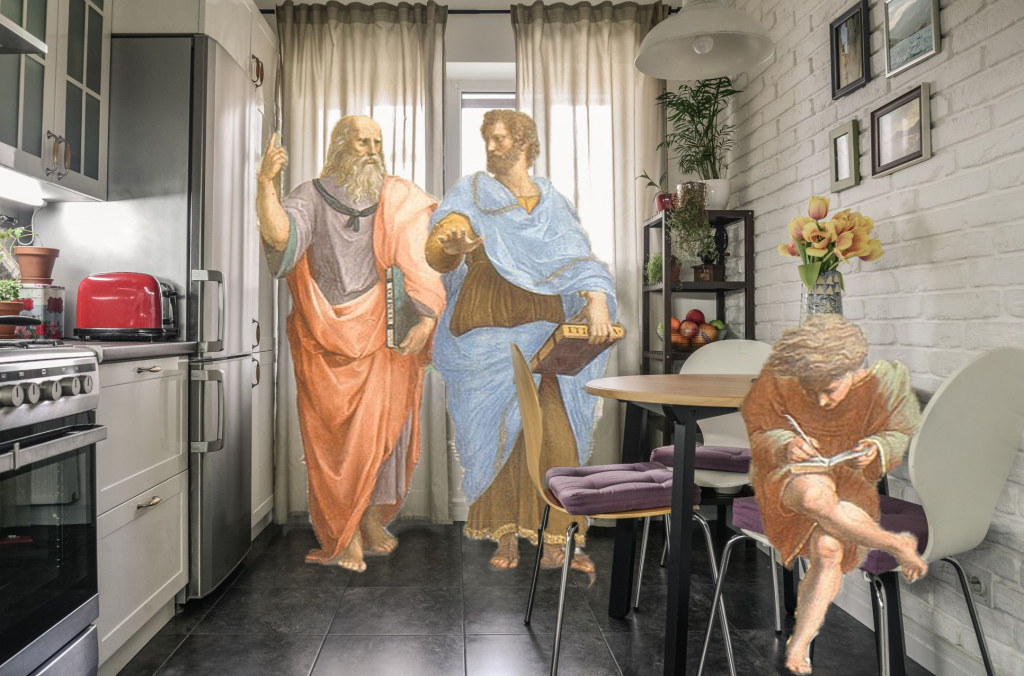Teaching Philosophy to High Schoolers Stuck at Home
With K-12 students across the world at home instead of school, and with school districts varying in how they are educating them under these circumstances, some parents are taking it upon themselves to supplement their children’s education.
And some are interested in teaching their kids philosophy.
One follower of Daily Nous asks:
With schools closed, I would like to develop an informal intro to philosophy course for my high school daughters. Thought it would be nice for us to learn together. Would you mind giving a recommended reading list or syllabus for an improvised intro to philosophical course? Thanks.
It would seem to me that such a course should make use of materials easily and freely available online, and could include primary and secondary readings, videos, lectures, interviews, podcasts, etc.
Here’s one suggestion to start: Plato’s Crito (which is available here along with many of Plato’s other works), followed by the first chapter of William Frankena’s Ethics, available here, in which he unpacks Crito in a straightforward style similar to how many philosophy professors might.
What are your suggestions?
Related: “Stock a High School Library with Philosophy Books“, “Online Philosophy Materials for High School Students“, “Designing a High School Logic & Critical Thinking Course“, “A Collection of Stories for Teaching Ethics”




If you would like to learn about some 17th and 18th century women philosophers, Project Vox has some great resources,, and they were even designed with curriculum development in mind. http://Www.projectvox.org
Hello, I have listed podcasts, online lectures and websites I have been using in my online studies here: http://www.jeroenseynhaeve.com/philosophy-resources/
The LCP Foundation will be rolling out a critical thinking course starting tomorrow afternoon. Theme: how best to argue with strangers on the Facebook. We’ll cover simple logic basics, a few moral foundations, and some Kant. The course is geared towards adults, but I think high schoolers will enjoy the material. Check out the academy page at:
http://www.lcpfoundation.wordpress.com
(also working on activities for “kids of all ages”)
I’d like to note that we switched the format up on the LCP academy. We tried to do too much with that first critical thinking course. So we’ve broken it down into 6 videos covering logic basics. We now have our quizzes ready to accompany those videos. And we’re re-working our whole website to be one big philosophy classroom. Stay tuned for more presentations, mini-courses, and content! For now, while we’re revamping the site, please do email our Philosopher in Chief at [email protected] to get in on our Discord course discussion boards and to inquire about our private philosophical consultation services/tutoring!
PLATO has an online “Philosopher’s Toolkit” where they have “a variety of different lesson plans that can be used to lead philosophical discussions among pre-college students.”
https://www.plato-philosophy.org/teachertoolkit/
Hello there –
I would recommend the NYT article, *The Singer Solution to World Poverty* .
I have used the article many times with EXPLO at Yale University, an international summer learning program for high schoolers. The formulation of the trolley problem with ‘Bob’s Bugatti’ tends to stimulate especially great discussion.
The Wireless Philosophy series is also a great resource for this purpose (it’s like Khan Academy for philosophy):
https://www.youtube.com/user/WirelessPhilosophy
Hi Daily Nous,
In reply to your query about what to teach high-school kids who are curious about philosophy; may I suggest the excellent content on the OpenLearn, (Open University website)? This content is completely free to use and is made up from sections of both past & current Open University modules. Masses of content at varying levels. The Open University is an expert at teaching online – it’s what they do! Perhaps some universities around the world who are currently struggling with getting their lessons online might want to use this material too?
Type ‘OpenLearn’ into your web browser – it will take you to the Open Learn website, then type in ‘philosophy’ to the search box. (Couldn’t be simpler really). You have the option to create an account but this isn’t required if you choose not to. All the content is free to everyone.
I should admit to being a postgrad philosophy student with the OU at present.
I hope this suggestion is helpful to all those folks struggling at present to home-educate etc.
I’m a high school English teacher and former philosophy grad student. I embed a lot of philosophy in my 10th grade world lit course. I use the following second semester to introduce students to the discipline.
The Apology
The Allegory of the Cave
Meditations 1-3
Candide
This is a great idea. I set up a program to teach philosophy at a high school here in the Czech Republic and I’m hoping we can transition to an online format. These resources will help.
I also set up a program with David Hoinski and Justin Humphreys to teach philosophy at Woolslair Elementary and the Ellis School in Pittsburgh, and at the Allegheny County Jail. If anyone in the Pittsburgh area is interested in doing something similar please send me an email and I’ll try to help out.
[email protected]
The institutions involved were eager for this kind of thing, and the coursework didn’t take much time. Plus the discussions were wonderful. Some of the best conversations I’ve had about Plato’s republic were with children and inmates.
And for any philosophers around the Gallatin Valley of Montana, I could put you in touch with people at Emerson Elementary and Chief Joseph Middle School.
1000-Word Philosophy: An Introductory Anthology has many useful resources here, including an essay on philosophy for children:
https://1000wordphilosophy.com/teaching-units/
I would highly recommend Thomas Nail’s work on Lucretius (c. 99 BCE-55 BCE). Dr. Nail essentially reads quantum field theory back into De Rerum Natura, the only surviving poetic/philosophical writing of Lucretius’. Atomic theory has been demonized by the Catholic Church historically (see The Swerve by Stephen Greenblatt), and fundamentally misunderstood as crude or mechanistic materialism, neglecting the problem of turbulence, the swerve, or pedetic movement of matter (as Dr. Nail argues). His book Lucretius II: Ethics of Motion in particular coming out 4/1/20 articulates a “new kinetic materialism” that practically responds to the contemporary moment as one in which we’re accountable in “moving well together.” Dr. Nail’s reading of Lucretius offers a way to think about materialism otherwise than utilitarian, or the “contemplative materialism” Marx critiques Feuerbach for in his “Theses on Feuerbach.” The practical applications of this “new kinetic materialism” are arguably better apt at preparing upcoming generations with skillful means of ethically responding to crises like COVID-19 than the idealism characteristic of Plato or virtue ethics of Aristotle which tend to reify the individual activity of the soul at the expense of more collective notions of becoming-with other humans and non-humans alike.
The National High School Ethics Bowl (nhseb.unc.edu) has a lot of great resources available for prompting discussions about tough moral and political issues, including a searchable index of past case studies. Also, we’ll be piloting a new platform for virtual engagement in April: NHSEB Online. The platform will include a video-driven discussion venue, weekly “huddle” discussions with NHSEB staff and organizers, and more. To culminate what would have been our 2019-2020 season, we’ll host our first NHSEB Town Hall in May, featuring a moderated discussion with students from across the country! Check back soon or contact [email protected] for more information.
Can anyone suggest a remote tutor for a smart high schooler who wants to do an independent study in classical philosophy?